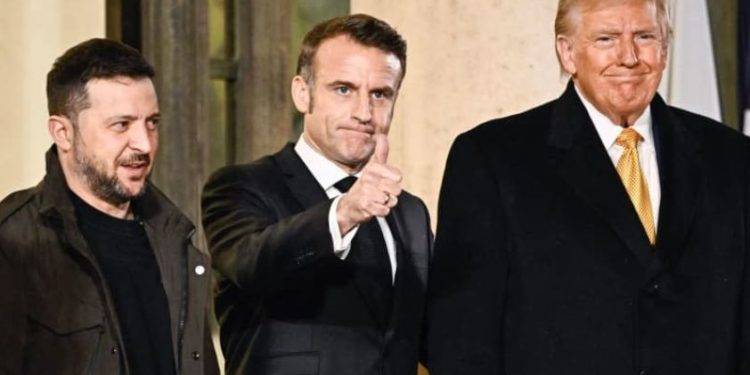French President Emmanuel Macron has called for stronger collaboration between the United States, European nations, and Ukraine to bring an end to the ongoing war in Ukraine, emphasizing the need for a peace agreement that safeguards Ukraine’s sovereignty while ensuring Europe’s security.
Speaking in Warsaw after a meeting with Polish Prime Minister Donald Tusk, Macron highlighted the importance of a united front in addressing the conflict, which has continued to ravage Ukraine. “We must work very closely with the Americans and, of course, with Ukraine, to find a solution that respects Ukraine's interests, its sovereignty, and ensures security for Europe,†Macron stated.
The meeting, which took place against the backdrop of Donald Trump’s anticipated second term as U.S. President, focused on bolstering support for Ukraine while addressing potential shifts in American foreign policy under Trump. European leaders have expressed concerns about maintaining consistent support for Ukraine as Trump’s presidency approaches. Macron emphasized the need for a peace process spearheaded by Ukrainians, saying, “A peace negotiated by the Ukrainians is essential, and it must offer them lasting security.â€
Macron further underscored the inseparable link between Ukraine's stability and Europe's security, calling for greater coordination among European nations. “A lasting peace in Ukraine means lasting security in Europe,†he remarked, urging European leaders to unify their strategies for providing Ukraine with security guarantees in the aftermath of any potential peace deal with Russia.
While Macron did not address the possibility of deploying a peacekeeping force involving foreign troops in Ukraine, reports indicate that confidential discussions have been ongoing among NATO member states. According to sources, France and Britain are leading these talks, exploring how a future ceasefire in Ukraine might be monitored to ensure its sustainability.
NATO representatives have reportedly been in discussions for weeks about potential mechanisms for enforcing peace in Ukraine. The possibility of deploying peacekeeping forces or implementing robust monitoring systems has emerged as a focal point in these deliberations. As key players in the NATO alliance, France and Britain are expected to play significant roles in shaping these plans, with both nations demonstrating a commitment to ensuring peace in Ukraine.
The war in Ukraine, which began in 2022 with Russia's full-scale invasion, has had devastating consequences, displacing millions and leading to widespread destruction. Despite several rounds of peace negotiations over the years, a durable solution has remained elusive. Ukrainian President Volodymyr Zelenskyy has maintained that any peace deal must ensure Ukraine’s sovereignty and territorial integrity, including the restoration of territories occupied by Russia.
Macron’s appeal for closer U.S.-Europe collaboration comes at a critical time, with global attention focused on the war's resolution. The involvement of major powers like the United States, which has provided significant military and financial aid to Ukraine, and Europe, which has borne the brunt of the war's humanitarian and economic consequences, is seen as pivotal in shaping the post-war landscape.
The French President’s remarks also reflect broader concerns about Europe's ability to independently address security challenges. Macron has previously advocated for a more autonomous European defense strategy, arguing that the continent must be prepared to take greater responsibility for its security. His call for unity among European nations in supporting Ukraine aligns with this vision, emphasizing the need for collective action to address the crisis.
Polish Prime Minister Donald Tusk echoed Macron’s sentiments during their meeting, emphasizing Poland’s commitment to supporting Ukraine. As one of Ukraine’s closest neighbors and a key NATO member, Poland has played a crucial role in assisting Ukrainian refugees and providing military aid. Tusk stressed the importance of ensuring Ukraine's long-term security, stating that Poland remains dedicated to collaborating with other European nations and the U.S. to achieve this goal.
The path to peace in Ukraine remains fraught with challenges, including ongoing hostilities and deep-seated mistrust between the parties involved. However, Macron’s call for a united front offers a glimmer of hope for a resolution that addresses the concerns of all stakeholders. As discussions continue, the world will be watching closely to see how international leaders navigate the complexities of the conflict and work toward a lasting peace.
The stakes are high, not only for Ukraine but also for the broader international community. A stable and secure Ukraine is essential for maintaining peace and stability in Europe, and the outcome of the conflict will have far-reaching implications for global geopolitics. For now, the focus remains on fostering collaboration among key players and ensuring that any peace agreement upholds Ukraine’s sovereignty and territorial integrity.
As Macron concluded his remarks, he reiterated the need for a peace that benefits all parties while preserving the principles of international law. “The interests of Ukraine, Europe, and global security must guide us. This is a shared responsibility, and we must act with unity and determination to achieve it,†he affirmed.
The coming months will be critical as negotiations and diplomatic efforts intensify. For now, leaders like Macron and Tusk are working to keep the spotlight on Ukraine, ensuring that the world remains committed to finding a just and lasting solution to one of the most significant conflicts of our time.




No comments yet
Be the first to share your thoughts!